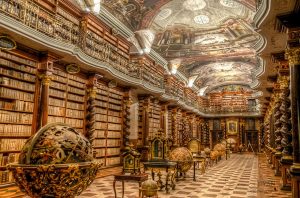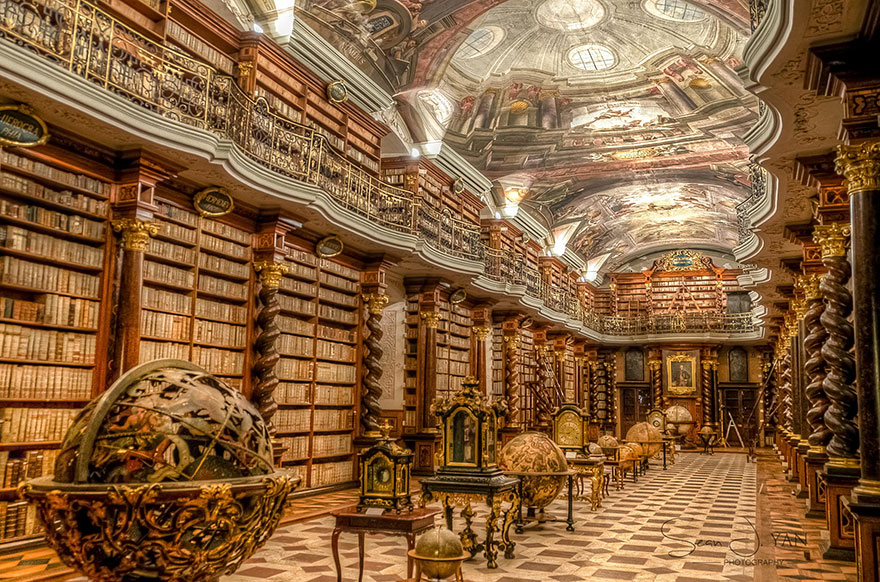A little over a year ago I returned from my first trip to the Czech Republic. It was a life changing experience. The main thing that changed for me was starting to understand just how little I actually know.
A tiny bit more than nothing.
It was actually a very overwhelming, humbling, humiliating feeling. I thought I knew something, but it was like I took a tiny peek into the world’s biggest library (a library full of books that I mostly can’t even read yet) and, well…of course that hurt my pride quite deeply.
By the way, I am imagining a library like this:

The Klementinium Library, the most beautiful library in the world, is in Prague.
But in reality, a Czechophilic’s dream library exists 1.5 hours away from me in the National Czech & Slovak Museum & Library in Cedar Rapids Iowa. See?
I can’t bear the thought of staying outside of that library. I am willing to do whatever it takes, including submitting myself to feelings of humiliation, frustration, and all kinds of other deeply painful feelings, for the chance to learn about this part of the world, and this part of my own history. So for the past year I have been trying to learn everything I can about everything having to do with Czech history, Czech culture, Czech literature, and then, Czech itself.
Why it’s so hard:
1. I don’t even know what I don’t know.
2. I don’t know how to acquire the knowledge I lack.
3. Physical limitations of reality.
These conditions are all stumbling blocks to my learning. I feel like a year later, after this mind blowing experience which caused me to suddenly become an obsessive hyper-focused neurotic maniac, I still know only a tiny bit more than nothing.
“Look how much more you know now!”
Yeah. Well. It’s still very disheartening to know with clarity how little I know and how unqualified I am. How stupid I feel. It is so frustrating.
Where does one go to find extra reserves of patience with one’s self? I don’t know.
What I do know, or at least hope, is that there exist other people who are frustrated with this learning curve, just like me. Part of the problem is that for some reason, my brain can’t really wrap itself around macrohistory. I fall asleep. It’s not until I start reading about feelings, people, specific conversations, events – these bring history alive. It’s so much more interesting to be able to imagine the world in which these people lived in specific terms, rather than an outline of bullet points.
I think it would be a gross error for us to avoid alluding to the menacing nature of the Habsburg dynasty. If we just say, “Hey, these guys were on the throne for 400 years,” it’s not going to convey this, “Hey, a foreign monarchy from one giant family ruled the Czech lands for 400 years and it took a world war to depose them.” The very nature of writing history means casting judgment. If we don’t do it clearly, the poor reader (me!) is not going to get it.
There has to be another way to approach European History than to say, “Here’s all the dry facts with no analysis about what they mean. Memorize them all, and until you do, you know nothing.”
I tried to read a couple of books about Czech history that were essays translated from Czech, and they were really difficult to get through. The only one that I remember was extremely disturbing because it was a case study about a child rape in the 1500’s, and the largest section of the essay was actually a translation of a transcription of the actual case – pages and pages. To be honest, that story, as horrible as it was, helped show me this past world better than any Wikipedia page about the Austrian Empire or Ferdinand I ever did. But I don’t want to write about it because it was too sad.
I’m reading The Coasts of Bohemia and Sayer does a much better job of getting his point across…when he’s not being super-duper-ultra witty. Sometimes I have to read his sentences 3 times before I can understand what he’s trying to say. He uses really difficult vocabulary and really long sentences and presupposes that you already know a lot of things. Fortunately, I’m the exact target reader, and if it weren’t for Stumbling Block Number Three, I would have already devoured this book.
I read The Wall: Growing Up Behind the Iron Curtain to my kids. This is an excellent book, by the way.
Why can’t there be a book like this – a straightforward, easy to read, illustrated children’s book – about the Thirty Year’s War? Franz Josef II? Maria Teresa? The counter-reformation? I wasn’t taught about any of these people or events in school, and one whole year of my high school education was in Europe!
But why would France feel the need to teach me about Czechoslovakia?
Which brings me to the most significant stumbling block of all:
4. Ethnocentrism, i.e. the history (etc.) of a small European country is not considered important by the rest of the world.
Why do historians somehow feel like they have to prove themselves by being the most dry and boring creatures on earth – myself included! There’s this constant feeling of needing to prove your legitimacy when you are writing macrohistory. It’s so frustrating. When applied to microhistory, it makes perfect sense.
But our ancestors lived in the foreign country of the past, and if we don’t understand that world, we really can’t understand them. We won’t even be able to find the important records of their lives if we don’t understand what was going on in the broader world around them – politically, socially, religiously, every other -ly you can imagine. We need to understand them all.
I don’t want to become guilty of writing fiction about my ancestors, even if the only book that ever gets written is the one in my head. I want to understand what really happened.
What I wish I knew about Czech History? What I would learn if I had spent my childhood growing up there: the thoughts and opinions of the previous generation(s). The political opinions of the people around me, which pull and tug at my own opinions. The simplified stories about the past told to me by my parents, showing me what to think. The stories of forgotten heroes like Gabčík and Kubiš of Operation Anthropoid, whose names I had never heard until two weeks ago, but whom every Czech remembers.
I feel really doubtful about being able to learn what I deeply desire to know on my own. Maybe this means pursuing an academic path towards gaining knowledge. Or maybe the path lies somewhere else. I’m going to keep looking for it.








This comment has been removed by the author.
Error in previous post.
Katie, good topic. I wonder about the affect of the local politics on my ancestors.
I often think of my ancestors and wonder about their day to day life. I think about odd things like them making kraut and what their kraut crocks looked like. I wonder about their 11 or so acres (as chalupers) and the sowing of seeds, weeding, watering, and harvesting. I wonder about their ducks and geese and the feeding and housing of their animals. I wonder about their clothing, especially their shoes. I wonder about going to church services. I wonder about the local government and the taxes paid by 30% of their crops. (grow 100 cabbages, give 30 for taxes) I wonder about how my ancestors participated in religious struggles. They were evangelists, not Catholics. I wonder about their home. Did they always have dirt floors? (they left in 1874) Lots of wondering about their day to day life.
I too feel like I've just touched the tip of the iceberg in my understanding of my Czech heritage. I am so thankful that last year I was able to visit to The Wallachian Open Air Museum in Roznov, Moravia, Czech Republic. It was an excellent hands-on experience in learning about my ancestors' daily lives – I could actually visualize parts of their lives. The Frenstat museum was also very informative with its displays.
As for the history, I try to digest it in small pieces.
Linda